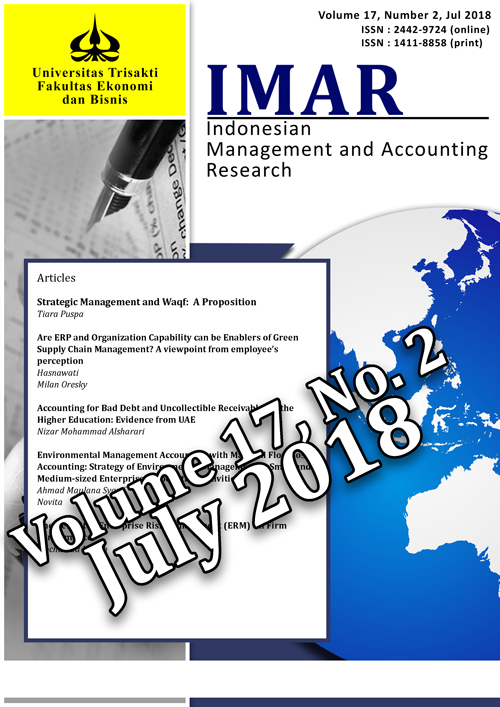Environmental Management Accounting with Material Flow Cost Accounting: Strategy of Environmental Management in Small and Medium-sized Enterprises Production Activities
Main Article Content
Abstract
The purpose of this research is to analyze activities of related environmental costs that occur and how to manage the use of raw materials and energy in the production process. Research methods used are observation, interview, and documentation. While methods of analysis research data using qualitative descriptive analysis i.e., describing object examined through data collected to produce a generally accepted conclusion. Based on data retrieved explains that activities related to environmental management in the tofu production process has not been made optimally. This impact on the cost of environmental management has not been presented in environmental quality cost report which is divided into four types, namely prevention cost, detection cost, internal failure cost, and external failure cost. The results of the analysis in this research obtained information that raw material costs into positive output (product) of 88,74% and negative output (material losses) of 11,26%. This environmental quality cost report that is used as consideration in management decisions related to waste management as well as increased production practices related use of raw materials and energy in the production process as an effort to reduce material loss and minimize negative impact to the environment.
Downloads
Plum Analytics
Article Details
- Journal publication right belongs to journal management with the author's knowledge, while moral publication right belongs to the author.
- The formal legal aspect of the journal publication accessibility refers to the Creative Commons license Attribution-NonCommercial-No Derivative (CC BY-NC-ND), which means that publication can be used for non-commercial purposes and in its original form (can not be modified).
- Each journal publication (print/electronic) is open access for educational purposes, research, and library. Beyond those, journal management is not responsible for copyright violations by certain parties.
References
Asian Productivity Organization (APO). (2014). Manual on Material Flow Cost Accounting: ISO 14051. Japan.
Cahyandito, M. Fani. (2009) . Environmental Management Accounting (EMA). Bandung : Universitas padjajaran.
Chairunnisa, A. (2016). Perancangan Material Flow Cost Accounting (MFCA) dalam Upaya Efisiensi Penggunaan Bahan Baku dan Energi. Program Sarjana Ekonomi : Skripsi Tidak Diterbitkan.
Chang et al. (2015). “Material Flow Cost Accounting System for Decision Making: The Case pf Taiwan SME in the Metal Processing Industry." Asian Journal of Finance & Accounting.
Eliyah, P., Eliata, I., dan Kelvin. (2012). “Analisa Biaya Lingkungan pada UKM Produsen Tahu di Jombang dengan Pendekatan Akuntansi Manajemen Lingkungan”. The 1st Symposium in Industrial Technology.
Furukawa, Y. (2008). Material Flow Cost Accounting. Japan.
Hansen, Don R., and Mowen, Maryanne M. (2007). Managerial Accounting. 8th edition. South-Western, USA: Thomson Learning.
Harimisa, S.R., Nangoi, G,B., dan Runtu, Treesje. (2018). “Analisis Penerapan Akuntansi Manajemen Lingkungan pada UD. Santoso di Manado”. Jurnal Riset Akuntansi Going Concern 13(2), 300-311.
Haryanto, Widiari. (2010). Analisis Penerapan Akuntansi Lingkungan di RSU PKU Muhamadiyah Yogyakarta. <http://www.pustakaskripsi.com/ analisa-penerapan-akuntansi-lingkungan-1442.html>. [16 Desember 2016]
IFAC. (2005). International Guidelines on Environmental Management Accounting. New York:International Federation of Accountants.
Ikhsan, Arfan. (2009). Akuntansi Manajemen Lingkungan. Yogyakarta : Graha Ilmu.
Kasemset, C., Boonmee, C., Khuntaporn, P. (2016). "Application of MFCA and ECRS in Waste Reduction: A Case Study of Electronic Parts Factory." Proceedings of the 2016 International Conference on Industrial Engineering and Operations Management.
Katherine, Leanne Christ. & Roger, Burritt. (2017). "Material Flow Cost Accounting for Food Waste in The Restaurant Industry." British Food Journal Vol. 119.
Kementrian Koperasi dan UKM. (2013). Perkembangan Data Usaha Mikro, Kecil, Menengah (UMKM) dan Usaha Besar (UB), [Online] Tersedia : http://www.depkop.go.id/berita-informasi/data-umkm/. [16 Desember 2016]
Loen, Mishelei. (2018). “ Penerapan Green Accounting dan Material Flow Cost Accounting (MFCA) Terhadap Sustainable Development”. Jurnal Akuntansi & Bisnis Krisnadwipayana Vol. 5 No. 1.
Meilanawati, R. (2013). “Analisis Pengungkapan Biaya Lingkungan (Environmental Costs) pada PT. Semen Indonesia Persero, Tbk”. Universitas Negeri Surabaya
Ministry of Economy, Trade and Industry (METI). (2010). Material Flow Cost Accounting MFCA Case Examples. Japan.
Pratiwi, Mega. (2011). Akuntansi Lingkungan sebagai Strategi Pengelolaan dan Pengungkapan Tanggung Jawab Lingkungan pada Perusahaan Manufaktur. Surabaya: Universitas Negeri Surabaya. < http:// ejournal.unesa.ac.id/article/9131/57/article.pdf>.
Ramli dan Ismail. (2013). “Environmental Management Accounting Practices: A Survey of ISO 14001 Certified Malaysian Organizations”. Journal of Energy Technologies and Policy.
Rustika, Novia. (2011). Analisis Pengaruh Penerapan Akuntansi Manajemen Lingkungan dan Strategi Terhadap Inovasi Perusahaan (Studi Empiris Pada Perusahaan Manufaktur yang Terdapat di Jawa Tengah). Skripsi, [online]. Semarang: UNDIP. < http://eprints.undip.ac.id>.
Schmidt and Nakajima. (2013). “Material Flow Cost Accounting as an Approach to Improve Resource Efficiency in Manufacturing Companies." International Resources Journal.
Schmidt, A., Hache, B., and Herold, F. (2013). “Material Flow Cost Accounting with Umberto." Jurnal IT Support for Material Flow Cost Accounting.
Setthasakko, W. (2010). “Barriers to the development of environmental management accounting: An exploratory study of pulp and paper companies in Thailand." EuroMed Journal of Business, 5(3), 315–331.
Soewadji, J. (2012). Pengantar Metodologi Penelitian. Jakarta.
Sugiyono. (2013). Metode Penelitian Pendidikan Pendekatan Kuantitatif, Kualitatif, dan R&D. Bandung: CV Alfabeta Bandung.
________. (2011). Metode Penelitian Pendidikan Pendekatan Kuantitatif, Kualitatif, dan R&D. Bandung: CV Alfabeta Bandung.
Sygulla, R., Bierer, A., dan Gotze, U. (2011). "Material Flow Cost Accounting – Proposals for Improving the Evaluation of Monetary Effects of Resource Saving Process Designs." Proceedings of the 44th CIRP Conference on Manufacturing Systems.
Tanc, A., and Gokoglan, K. (2015). “The Impact of Environmental Accounting on Strategic Management Accounting: A Research on Manufacturing Companies." International Journal of Economics and Financial Issues.
United Nations Division for Sustainable Development (UN DSD). (2001). Environmental Management Accounting – Procedures and Principles. New York: United Nations.


